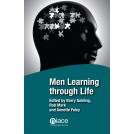Men learning – in sheds or not
I’ve been reading a collection which focusses on how and why men do or don’t learn as adults. It’s a basic component of the Paula Principle picture that men appear more reluctant to engage in learning, formal and informal, across most OECD countries. The PP looks at the consequences of this (or lack of them) for women ; Men Learning Through Life asks what this reluctance means for men. It is not an exhibition of ‘moral panic’ about male disadvantage, but a good research-based look at a distinctive issue and what might be done about it.
The book draws its inspiration from pioneering studies done some time ago by Veronica McGivney. She was the first (at least in published form) to point out how adult men disappeared from the learning lists. Men Earn, Women Learn was the neat title of one of her early studies. This is interesting for me not only, obviously, because of its content, but also because Veronica was a woman writing about the experiences of the other sex. I’ve just had the PP book turned down by a publisher on the grounds that I’m a man, and one question for me is whether this is judgement is based on an accurate sense of the market – and whether it raises any ethico-political issues.
Anyway, back to MLTL . The book covers a number of countries – Ireland, Greece, China and New Zealand, but the mainspring is Australia, and particularly the “men’s sheds” movement there.
The sheds are places where men, especially those who have worked mainly in manual jobs can get together, just for a chat but also to practice their skills, work-related or not, and to learn new ones. Typical skills are wood-turning and painting. They can also pass on their skills – one or two sheds were set up to help intergenerational learning, where the older men offer guidance to adolescent boys who are not doing well at school. The important thing is that it’s a place where they feel comfortable; the sheds cater especially for men with few qualifications who are often on the margins of the labour market, and who have never felt at ease in a formal educational environment.
Australia is a country with a fairly pronounced masculine culture. I can’t be the only person who recalls the Bazza Mackenzie strip cartoon and the dubious practices which took place in the shed there.
 (More recently we had the real-life spectacle of a female prime ministerJulia Gillard, being on the end of some truly awful treatment.) So the sheds raise some interesting questions for contemporary thinking on gender. The authors address the issue of whether setting aside spaces for men reinforces gender differences generally. There are some obvious respects in which it does, but the overall message is that if men can use them to engage in learning, including communicating about what they are doing, this has a broader social benefit. Sheds can alleviate the difficulties of some marginalised groups. And in doing so they may help their families also.
(More recently we had the real-life spectacle of a female prime ministerJulia Gillard, being on the end of some truly awful treatment.) So the sheds raise some interesting questions for contemporary thinking on gender. The authors address the issue of whether setting aside spaces for men reinforces gender differences generally. There are some obvious respects in which it does, but the overall message is that if men can use them to engage in learning, including communicating about what they are doing, this has a broader social benefit. Sheds can alleviate the difficulties of some marginalised groups. And in doing so they may help their families also.

